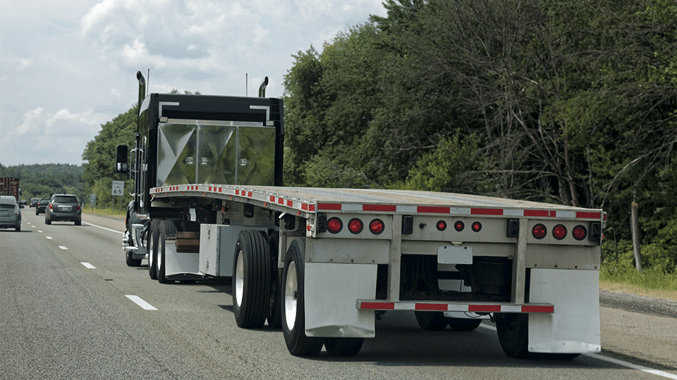Truck drivers are foundational pieces of the American business landscape, touching every supply chain in one way or another.
Dry van drivers haul palletized and loose commodities along North American roadways, helping manufacturers, suppliers, wholesalers and retailers fulfill their commitments.
Reefer operators ensure temperature-sensitive goods reach their destination unchanged, protected from the lasting impact exposure can cause.
The list goes on.
Bulk liquids, hazardous goods, heavy machinery, raw materials, automobiles, food and beverage products, agriculture equipment and aerospace components are all moved from A to B by truck drivers — and this only scratches the service.
However, some loads are more challenging than others. Some freight moves simply can’t be executed without the right knowledge, training and experience — things that are acquired over time.
As a shipper, your freight — whether it's textiles or generators, bottled beverages or structural steel — is fundamental to what you do. Every time your cargo moves, your business has a lot on the line.
That said, without an experienced, qualified and reliable driver behind the wheel, things can go wrong quickly — disrupting your budget and relationships.
For this reason, it’s important to realize the profound importance of truck driver experience and quality and take steps to understand what they truly mean.
How much experience is enough to move your freight?
What does truck driver “quality” really mean?
Most importantly, how can you make sure that the driver on your freight has the proper expertise to do so?
Here at Anderson Trucking Service (ATS), our hundreds of drivers — who haul everything from retail cargo to wind turbines — are held to the highest possible standards. Additionally, our in-house processes ensure each driver (from vans to heavy haul) has the appropriate experience to move each load.
In this article, you’ll receive a comprehensive overview of what driver experience and quality actually mean in the trucking industry. We’ve also provided a detailed list of questions to ask prospective carriers to make sure they have the experience and values you deserve.
Below, you’ll find information bucketed as follows:
- What does truck driver experience mean?
- What does truck driver quality mean?
- Why do truck driver quality and experience matter?
- How to pick the right carrier
What Does Truck Driver Experience Mean?
Being experienced or having experience, in the trucking profession, has various definitions.
According to the Department of Transportation (DOT), a truck driver is considered to be experienced following one year of moving freight.
For your purposes, however, this definition is a bit broad. And, in an industry where safety and safe practices are so important, there is no catch-all definition for when an individual truck driver is truly “experienced.”
At ATS, for example, dry van drivers are hired after they've had a minimum of six months of over-the-road experience. Other companies may require more or less.
Qualifying as “experienced” will also depend on the type of freight a driver moves.
Dry van shipments are some of the most straightforward freight truckers haul, requiring fewer months of training and a shorter learning curve for drivers to round. As a result, dry van truck drivers can develop “experience” far quicker than those moving more specialized cargo.
Legal open-deck shipments, transported on bi-axle flatbed or step-deck trailers, are similar to dry van shipments in this way. Often, truck drivers begin their careers moving these loads. Alongside a trainer, open-deck truck drivers hone their craft, getting comfortable with hauling, securing and maneuvering these loads.

Like the drivers that begin their careers transporting general dry van commodities, trucking companies use legal open-deck freight shipments to help educate, train and raise the experience level of new drivers.
The time it takes for truck drivers to become comfortable with their duties and gain experience varies from one company to the next.
Primarily, the volume and diversity of opportunities offered to drivers — to haul more freight, different kinds of freight, etc. — impacts their rate of progression.
For example, a flatbed truck driver that hauls three loads per week, logging an average of 1,500 miles over that period, will (in theory) gain more experience than one who travels 800 miles, moving only two. The freight volume discrepancy between these drivers translates to more than four loads and 2,800 miles per month in the first driver’s favor.
Over time, it is safe to assume that this first flatbed trucker (who logs more time on the road, thereby encountering more scenarios) will gain experience faster than the second.
In the end, it may take a driver that’s exposed to a high volume of freight two years to reach the same level of experience as a more tenured truck driver whom it took four.

For this reason, it’s difficult to neatly pinpoint the level of experience you should expect a truck driver to have in order to fully trust their ability.
That said, here are some relative tenure ranges to consider:
| General Dry Van Loads | Legal Flatbed Loads | Over-Dimensional Flatbed Loads | Heavy Haul Shipments | |
| Driver Tenure | 6 months-2 years | 6 months-2 years | 2-5 years | 3-10 years |
Beyond simply the length of time they’ve spent behind the wheel, there are certifications which, when earned, qualify drivers to haul more specific, delicate freight.
Tanker endorsements allow truckers to move bulk quantities of liquid and gases and hazmat endorsements give drivers the opportunity to haul hazardous materials.
Though earning these endorsements allows drivers to haul hazmat/tanker cargoes, experience is the only way to be acquainted with certain realities of moving them.
For this reason, make sure to ask each carrier about the training practices and experience of their drivers.

What Does Truck Driver Quality Mean?
Compared to a driver’s experience level, the “quality” of each driver is a bit easier to universally quantify.
With so many commercial motor vehicle operators in the trucking industry, the Federal Motor Carrier Safety Administration (FMCSA) has its work cut out for it.
To ensure trucking companies (and their drivers) practice compliance with government regulations and prioritize safe practices, the FMCSA assigns points to each violation.
Together, these points — known as compliance, safety and accountability (CSA) points — serve as a record-keeping device, differentiating quality trucking companies (and drivers) from the field.
Although gauging the quality of a truck driver can be done in a number of ways, here are the seven Behavior Analysis and Safety Improvement Categories (BASIC) the FMCSA uses to group carriers:
- Unsafe Driving
- Crash Indicator
- Hours-Of-Service Compliance
- Vehicle Maintenance
- Controlled Substances/Alcohol
- Hazardous Materials Compliance
- Driver Fitness
Among other things, a quality truck driver, in the eyes of the FMCSA and the larger transportation industry, is one with. . .
- A history of safe driving practices
- Few accidents/crash involvement over a set time period
- Few/no DOT violations (i.e., failing to possess necessary licenses/permits, failure to maintain the vehicle/equipment properly, not adhering to hours of service regulations)
- Few citations from law enforcement (two or more years without a citation is best).
Should a truck driver fail to adhere to a single governmental rule or regulation, their carrier’s overall reputation for quality (as reflected by their CSA score) will suffer.
While each offense impacts carriers in different ways — with the number of points awarded changing situationally — they remain on a carrier’s record for two years and a driver’s for three.

Related: What is a CSA Score and Why Should I Worry About It?
Make sure to check up on your carrier’s safety violations and histories to ensure they are consistently meeting the standards set for quality carriers.
Here are some third-party websites that regularly report on carrier safety:
Why Does Your Truck Driver’s Experience and Quality Matter?
As a shipper, truck driver experience and quality are important for the security of your cargo, the maintenance of your reputation and the safety of the motoring public.
When it comes to driving a truck, there are things that can only be learned through experience. Without putting in the hours and working their way up, a truck driver can’t successfully perform their duties and remain in the top tier of industry quality.
Here’s how truck driver experience and quality impacts. . .
- Your cargo security
- Your company’s reputation
- The safety of all parties
- The potential for legal issues involving your business
How Truck Driver Experience/Quality Impacts Your Cargo’s Security
Truck drivers get better at their jobs as time goes on, as they're given more opportunities to learn through training, repetition and trial and error. For this reason, it’s more common for cargo damage to happen with a less experienced driver at the helm.
Whether it's due to crushing or rubbing during securement, because a driver misread a turn or otherwise, damage can occur at all junctures of a freight’s journey.
Learning to navigate these scenarios successfully and take steps to mitigate cargo damage are all things that truck drivers learn over time.
Among other things, related to cargo security, experience teaches drivers:
- How to properly block, brace and secure dry van freight
- How to properly apply tarps to open-deck freight
- How to safely secure open-deck cargo to avoid causing damage
- How to maneuver full-truckload freight quantities (both legal and over-dimensional)
At the end of the day, a well-educated truck driver who has seen, experienced and been trained to navigate all this industry throws at them is far better suited to help you become the supplier that always delivers for your customers.
How Truck Driver Experience/Quality Impacts Your Company’s Reputation
Delivering on its customer commitments is the goal of every business — yours is no exception. That said, without a well-rounded truck driver transporting your freight, your reputation of coming through for customers may suffer.
You see, among the many things truck drivers learn as they progress in their career are skills in managing their hours of service, communicating with stakeholders, performing pre-trip inspections and budgeting their time.
Without the benefit of experience, however, truck drivers may struggle to meet your expectations.
And, in the cut-throat business world, continued poor performance on your carrier’s behalf, might fall back on you — damaging your reputation in the process.
For this reason, it’s imperative that you only work with carriers that have a history of quality service and a fleet of well-experienced drivers; you’re only as good as your worst partner, after all.
How Truck Driver Experience/Quality Impacts the Safety of all Parties
All shipments boast some level of inherent risk; an 80,000-pound fully-loaded semi-truck and trailer traveling at 65 miles per hour (on average) can quickly become a recipe for disaster.

That said, as shipments get progressively larger and/or more specialized (as is the case with tanker, hazmat and oversized freight), so too does the risk and danger of moving them.
And, in order to safely move these shipments, having an experienced driver behind the wheel is a must. You simply can’t trust your freight to an unproven carrier; there’s too much at stake. Using drivers without the ability to properly maneuver each load, making adjustments where necessary and adhering to safety practices, may lead to serious injuries and/or death.
How Truck Driver Experience/Quality Impacts the Potential for Legal Litigation Involving Your Business
As the party that owns the freight, your proximity to it is undeniable. So, should an inexperienced and/or underqualified driver cause significant damage to person(s) or property while moving it, you’ll likely be involved (in one way or another) in any legal proceedings that follow.
Since legal litigation is never enjoyable, and can sometimes get messy and expensive, it’s important to avoid putting yourself in these situations — using experienced, quality drivers is a great way to do so.
Ensure Your Carrier Selection Decision is the Right One
Now that you have a better understanding of the profound impact truck driver experience and quality will make on your transportation decisions, let’s make sure your carriers are the best in the business.
There’s certainly a lot at stake for your customers, business and supply chain. So, to help you ensure each trucker you utilize has the experience and values needed to get your freight moved reliably, here are some questions you’ll want to ask each current and prospective carrier:
- What are your hiring guidelines? (Their answer should go above and beyond what the DOT requires)
- Do your trucks include dash cameras and lane departure mitigation?
- What steps do you take to continually educate and train drivers?
- What is the average tenure of your drivers?
- What kind of freight are your drivers most qualified to move?
- Is there any kind of cargo that your fleet never handles?
The way a carrier answers these, and questions like these, will give you a better understanding of where the overall experience and quality of their fleet stacks up.
For a comprehensive list of questions to ask prospective carriers, download the Freight Carrier Selection Checklist for free today.
Finally, if you have questions about the steps we take to ensure each ATS driver is legally compliant and gains the training they need, or if you’d like to learn more about how ATS can help out on your next load, don’t hesitate to reach out.




